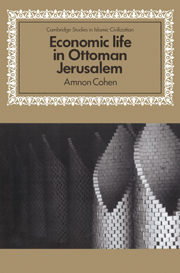Book contents
- Frontmatter
- Contents
- List of illustrations
- Note on transcription
- Map1
- Introduction
- 1 Butchers and meat consumption
- 2 Soap production and olive oil
- 3 Flour and bread
- Conclusion
- Note on abbreviations
- Note on weights, measures and monetary values
- Appendix 1 Meat prices in Jerusalem
- Appendix 2 Olive oil and soap prices in Jerusalem
- Appendix 3 Flour and bread prices in Jerusalem
- Appendix 4 A soap-factory in Jerusalem
- Notes
- Bibliography
- Subject index
- Geographical index
- Index of personal names
Introduction
Published online by Cambridge University Press: 10 November 2010
- Frontmatter
- Contents
- List of illustrations
- Note on transcription
- Map1
- Introduction
- 1 Butchers and meat consumption
- 2 Soap production and olive oil
- 3 Flour and bread
- Conclusion
- Note on abbreviations
- Note on weights, measures and monetary values
- Appendix 1 Meat prices in Jerusalem
- Appendix 2 Olive oil and soap prices in Jerusalem
- Appendix 3 Flour and bread prices in Jerusalem
- Appendix 4 A soap-factory in Jerusalem
- Notes
- Bibliography
- Subject index
- Geographical index
- Index of personal names
Summary
Every town is and wants to be a world apart […] all or nearly all of them between the fifteenth and eighteenth centuries had ramparts.
Where there is a town, there will be a division of labour.
(F. Braudel, Civilization and Capitalism 15th–18th Century (New York, 1979), Vol. 1, The Structures of Everyday Life, pp. 491, 479.)Jerusalem became part of the Ottoman empire, as did most of the Arabic-speaking provinces, during the last months of 1516. These major political developments came in the wake of a military campaign that put an end to three centuries of Mamluk rule in Syria, Palestine and Egypt. Covering an area that had never been regarded as militarily threatening or economically attractive, neither Damascus nor Cairo were originally considered by the Ottomans as important objectives. Jerusalem, much smaller in size and of minimal administrative consequence, was even less significant – its religious history notwithstanding.
Once these cities were incorporated into the Ottoman body politic, the rulers' initial lack of interest became irrelevant. They were the masters and acted accordingly. The first years of rule in the newly acquired territories must have been uneasy for both governor and subjects. The death of Sultan Selim and the succession of his son, Suleiman, in 1520, did not alleviate the situation.
- Type
- Chapter
- Information
- Economic Life in Ottoman Jerusalem , pp. 1 - 10Publisher: Cambridge University PressPrint publication year: 1989



